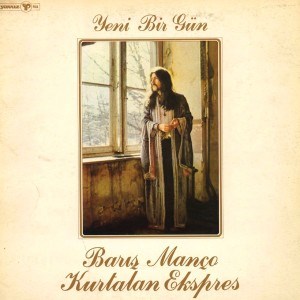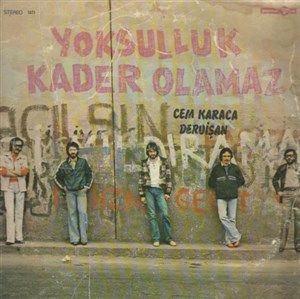
BY HASAN MURAT SÜMER (EE/IV)
hasan.sumer@ug.bilkent.edu.tr
I was very late in meeting my deadline this week, so I had to put this column together very quickly. I decided to use it to discuss some of my favorite songs and albums from two of the biggest names associated with Turkish folk music.
“Yoksulluk Kader Olamaz” (1977) was the second LP released by Cem Karaca. His first LP was a collection of his previously unreleased songs, so the tracks in “Yoksulluk Kader Olamaz” were the first songs he recorded for a long-playing album. His collaboration with the band Dervişan here resulted in his most ambitious effort in the musical sense, while at the same time he maintained the strong political aspect of his work. A conceptual approach used in the album has all of the tracks starting with the same melancholic piano part, which runs for about half a minute, with Karaca then saying the name of the song before it begins. It’s like he’s  introducing a poem; this is a beautiful touch, considering the fact that the lyrics of most of the songs come from poems by Nazım Hikmet, Can Yücel and Ahmed Arif. The song “Sevdan Beni,” which shares its name with the poem by Ahmed Arif, is arguably the finest of Karaca’s works. If a song has a running time of 11 minutes, there should be enough space in it for some experimental and psychedelic passages, some solos and some sections where the singer can display his vocal talent; and in this case, the musicians took all these opportunities. Uğur Dikmen offers one of his best performances on the keyboards by providing a strongly psychedelic atmosphere at the beginning and contributing to the climax later in the song. Right after Karaca sings the chorus in his highest register, the guitar solo begins; as you listen, the keyboard comes out of nowhere to replace the guitar in the front, and continues delivering the solo. The two instruments work in really good harmony, so that you feel like you’re listening to one continuous instrumental solo; it’s truly beautiful. Unfortunately, none of it is included in the CD format of the album, because that version of the song ends right before the solo begins; it’s a real shame. The title track, which translates as “Poverty Cannot Be Destiny,” closes the album; this song contains the strongest political message on the album. Karaca is credited for its lyrics, and he reflects upon the poverty of an entire country and its population at that time. It’s a song that makes you think about things more than it makes you enjoy the music, a song that’s proper to listen to while smoking a cigarette; that’s the artist’s intention.
introducing a poem; this is a beautiful touch, considering the fact that the lyrics of most of the songs come from poems by Nazım Hikmet, Can Yücel and Ahmed Arif. The song “Sevdan Beni,” which shares its name with the poem by Ahmed Arif, is arguably the finest of Karaca’s works. If a song has a running time of 11 minutes, there should be enough space in it for some experimental and psychedelic passages, some solos and some sections where the singer can display his vocal talent; and in this case, the musicians took all these opportunities. Uğur Dikmen offers one of his best performances on the keyboards by providing a strongly psychedelic atmosphere at the beginning and contributing to the climax later in the song. Right after Karaca sings the chorus in his highest register, the guitar solo begins; as you listen, the keyboard comes out of nowhere to replace the guitar in the front, and continues delivering the solo. The two instruments work in really good harmony, so that you feel like you’re listening to one continuous instrumental solo; it’s truly beautiful. Unfortunately, none of it is included in the CD format of the album, because that version of the song ends right before the solo begins; it’s a real shame. The title track, which translates as “Poverty Cannot Be Destiny,” closes the album; this song contains the strongest political message on the album. Karaca is credited for its lyrics, and he reflects upon the poverty of an entire country and its population at that time. It’s a song that makes you think about things more than it makes you enjoy the music, a song that’s proper to listen to while smoking a cigarette; that’s the artist’s intention.
 Barış Manço’s album with the band Kurtalan Ekspres, “Yeni Bir Gün” (1979), also doesn’t have a CD release with the exact same content as the LP. I believe this album is the one in which Manço offers his best; it also is one of the most critical works of the Anatolian rock genre because of Manço’s progressive approach. The psychedelia in his previous LP, “2023” (1975), is toned down. Instead, incorporating electric instruments, primarily the analog synthesizer, into the folk songs without disturbing their folky nature is the main ambition. The imagery and plaintive tone of the anonymous folk song “Gesi Bağları” is reflected very well in Manço’s synthesizer-based version. Selda Bağcan’s version of this song is much better, with the flutes and all, but this one is also pretty good. The synthesizer melodies and bass lines are especially enjoyable in the song “Ham Meyvayı Kopardılar Dalından”; these aspects demonstrate Kurtalan Ekspres’s strengths.
Barış Manço’s album with the band Kurtalan Ekspres, “Yeni Bir Gün” (1979), also doesn’t have a CD release with the exact same content as the LP. I believe this album is the one in which Manço offers his best; it also is one of the most critical works of the Anatolian rock genre because of Manço’s progressive approach. The psychedelia in his previous LP, “2023” (1975), is toned down. Instead, incorporating electric instruments, primarily the analog synthesizer, into the folk songs without disturbing their folky nature is the main ambition. The imagery and plaintive tone of the anonymous folk song “Gesi Bağları” is reflected very well in Manço’s synthesizer-based version. Selda Bağcan’s version of this song is much better, with the flutes and all, but this one is also pretty good. The synthesizer melodies and bass lines are especially enjoyable in the song “Ham Meyvayı Kopardılar Dalından”; these aspects demonstrate Kurtalan Ekspres’s strengths.
To close, I want to mention Barış Manço’s song “Cacık” from a later album, because it’s another track that’s proper to listen to while smoking a cigarette. The song’s lyrics take you on a trip as seen through the eyes of the hopeless, troubled everyman, and you can easily make the connections to your own life. This song is the deepest stuff I’ve ever listened to.
